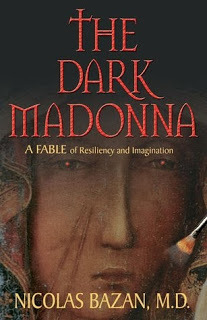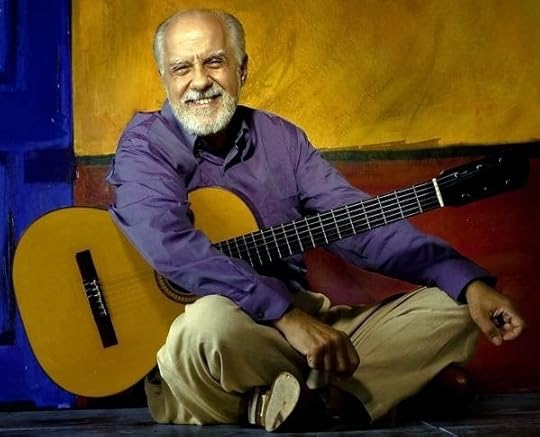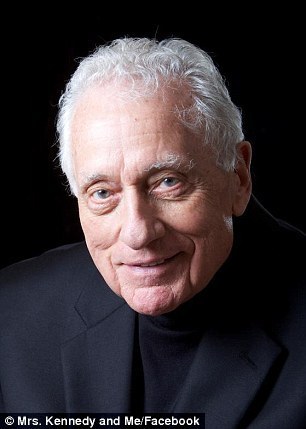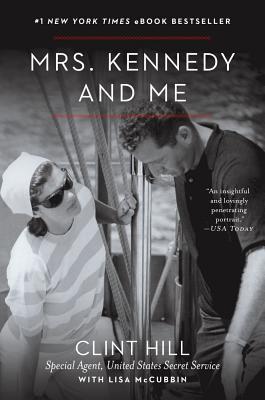Kenneth Atchity's Blog, page 199
October 2, 2013
The Pensive Chronicler Reviews Nicolas Bazan's The Dark Madonna
The Dark Madonna

Review: When I received a copy of this book from the
author Nicolas Bazan, M.D., I made an assumption that it was not going
to be an interesting novel due to the fact that it was only 104 pages
long. However, nothing could have prepared me for the impact that this
fable had on me. It was an amazing read.
What I found incredibly wonderful about this book was how well educated
Bazan really is. It was very intelligently written with a vast
vocabulary. The story flowed effortlessly from page to page and I was
never once lost or had to backtrack to see something that I might have
missed that would help me better understand what was going on further
along in the story. The author was able to combine fact and fiction in
such a way that it read almost like a real account of faith than just a
made up account of events.
Bazan also was able to create characters that pulled on your heart and
made you want to heal their wounded souls. Dr. Cruz is searching for
answers to neurological puzzles when he finds himself once again
questioning his faith. Standing in the gas chambers of Auschwitz, his
past escape from Argentina consuming him from a dream earlier, you can
feel his heart breaking. His wife is confused and you can see
her frustration with her husband's compulsions of answering life's
questions. Then there is Stephen, a young Pennsylvanian artist turned
monk, that places a religious pilgrimage upon Dr. Cruz. This young man's
passion and undying faith is so well put upon the page that it
rejuvenated my own wavering faith.
Overall, I thought it was brilliant, passionate, and extremely well
written. If you enjoy fables with heavy spiritual/religious meanings
then this book is for you. If you prefer fables that are a little
lighter in content or do not like fables, then this book is not for you.
I will leave you with one last thought that was a reoccurring theme throughout this fable:
"First we start by doing what is necessary, then we do what is possible, and then pretty soon we are doing the impossible." St. Francis quote from several pages in Nicolas Bazan's novel.
Rating: 4 stars out of 5


Review: When I received a copy of this book from the
author Nicolas Bazan, M.D., I made an assumption that it was not going
to be an interesting novel due to the fact that it was only 104 pages
long. However, nothing could have prepared me for the impact that this
fable had on me. It was an amazing read.
What I found incredibly wonderful about this book was how well educated
Bazan really is. It was very intelligently written with a vast
vocabulary. The story flowed effortlessly from page to page and I was
never once lost or had to backtrack to see something that I might have
missed that would help me better understand what was going on further
along in the story. The author was able to combine fact and fiction in
such a way that it read almost like a real account of faith than just a
made up account of events.
Bazan also was able to create characters that pulled on your heart and
made you want to heal their wounded souls. Dr. Cruz is searching for
answers to neurological puzzles when he finds himself once again
questioning his faith. Standing in the gas chambers of Auschwitz, his
past escape from Argentina consuming him from a dream earlier, you can
feel his heart breaking. His wife is confused and you can see
her frustration with her husband's compulsions of answering life's
questions. Then there is Stephen, a young Pennsylvanian artist turned
monk, that places a religious pilgrimage upon Dr. Cruz. This young man's
passion and undying faith is so well put upon the page that it
rejuvenated my own wavering faith.
Overall, I thought it was brilliant, passionate, and extremely well
written. If you enjoy fables with heavy spiritual/religious meanings
then this book is for you. If you prefer fables that are a little
lighter in content or do not like fables, then this book is not for you.
I will leave you with one last thought that was a reoccurring theme throughout this fable:
"First we start by doing what is necessary, then we do what is possible, and then pretty soon we are doing the impossible." St. Francis quote from several pages in Nicolas Bazan's novel.
Rating: 4 stars out of 5

Published on October 02, 2013 11:50
October 1, 2013
Oscar Castro-Neves dies at 73; bossa nova guitarist and orchestrator
Famous from age 16, Oscar Castro-Neves toured with Dizzy Gillespie and Stan Getz and orchestrated music for films and TV.
By Steve Chawkins

Guitarist Oscar Castro-Neves performed in a landmark bossa nova concert
at Carnegie Hall at age 22. In 1966, he moved permanently to the U.S.,
where his quick, gentle guitar style and murmuring vocals started
receiving rave reviews.
Oscar Castro-Neves, a Brazil-born guitarist who helped to create the cool, sensuous rhythms of bossa nova and orchestrated music for movies including "L.A. Story" and "Dirty Rotten Scoundrels," has died. He was 73.
Castro-Neves had cancer and died Friday in Los Angeles, his wife, Lorraine Castro-Neves, said.
Castro-Neves, who was noted for both his virtuosity and his impish sense of humor, toured with jazz greats Dizzy Gillespie and Stan Getz. For 10 years, he was guitarist, musical director and vocal coach for Sergio Mendes' Brasil '66 and went on to produce albums by luminaries as varied as cellist Yo-Yo Ma and jazz harmonica player Toots Thielemans.
"Oscar was the greatest fountain of music I've ever known," saxophone player Paul Winter told The Times on Sunday. "And he was perpetually funny."
Born May 15, 1940, in Rio de Janeiro, he was one of eight children in a musical family. With his mother playing guitar and an uncle playing cello, young Oscar took up the cavaquinho, a small, traditional Brazilian guitar, and piano.
"My uncle taught me the hip chords, and I was hooked," he told jazz pianist Ramsey Lewis in a 2005 PBS interview.
At 16, he was a huge success. After a recording artist heard Castro-Neves play at a party, his composition "Chora Tua Tristeza" (Cry Your Sadness) rocketed to the top of the charts and was widely recorded by others.
"It became the kind of song played at people's weddings," his wife said Sunday.
Shortly after the sudden fame, Castro-Neves heard the milkman singing one morning and ran outside in his pajamas.
"Hey, that's my song!'' he cried. "You're singing my song!"
"Yeah," said the milkman, curdlingly skeptical.
One in a set of triplets, Castro-Neves and three of his brothers formed a quartet that would play in the neighborhood and practice in a garage. He asked musician Antonio Carlos Jobim over for a beer, and they soon were part of the emerging bossa nova, a sexy "new beat" that reflected the optimism, albeit passing, of a new Brazil.
"Bossa nova is naive, a little boat, the sun, the sea, the illusions," he said in an interview years later. "'I lost my girlfriend but I will get her back tomorrow....'"
At 22, Castro-Neves performed in a landmark bossa nova concert at Carnegie Hall. In 1966, he moved permanently to the U.S., where his quick, gentle guitar style and murmuring vocals started receiving rave reviews as he toured with Getz, Frank Sinatra, Lalo Schifrin and others.
"Castro-Neves is incapable of creating a dull moment, but that is an understatement," wrote critic Leonard Feather. "He is only capable of generating rhythmic, harmonic, and melodic joy."
With homes in both San Diego and Los Angeles, Castro-Neves wrote the scores for a number of films, including "Blame It on Rio," a 1984 romantic comedy; and his arranging and orchestrating credits include "Sister Act II" and "He Said, She Said." He also wrote the music for Julia Louis-Dreyfus' TV series "Watching Ellie."
"He was so tuned in to films," his wife said. "When he was a child, his father used to rent 16-millimeter reels and invite everyone in the neighborhood to come over and watch movies."
The romance of the movies never left him.
For 15 years, he sent his wife three love notes a month, sometimes commemorating occasions such as their first kiss.
He spoke a number of languages and knew just enough in others to put native speakers at ease. Critically ill in the hospital, he chatted with a doctor in Korean.
In addition to his wife, Castro-Neves is survived by daughters Felicia and Bianca and four grandchildren.
Reposted From LA Times steve.chawkins@latimes.com
By Steve Chawkins

Guitarist Oscar Castro-Neves performed in a landmark bossa nova concert
at Carnegie Hall at age 22. In 1966, he moved permanently to the U.S.,
where his quick, gentle guitar style and murmuring vocals started
receiving rave reviews.
Oscar Castro-Neves, a Brazil-born guitarist who helped to create the cool, sensuous rhythms of bossa nova and orchestrated music for movies including "L.A. Story" and "Dirty Rotten Scoundrels," has died. He was 73.
Castro-Neves had cancer and died Friday in Los Angeles, his wife, Lorraine Castro-Neves, said.
Castro-Neves, who was noted for both his virtuosity and his impish sense of humor, toured with jazz greats Dizzy Gillespie and Stan Getz. For 10 years, he was guitarist, musical director and vocal coach for Sergio Mendes' Brasil '66 and went on to produce albums by luminaries as varied as cellist Yo-Yo Ma and jazz harmonica player Toots Thielemans.
"Oscar was the greatest fountain of music I've ever known," saxophone player Paul Winter told The Times on Sunday. "And he was perpetually funny."
Born May 15, 1940, in Rio de Janeiro, he was one of eight children in a musical family. With his mother playing guitar and an uncle playing cello, young Oscar took up the cavaquinho, a small, traditional Brazilian guitar, and piano.
"My uncle taught me the hip chords, and I was hooked," he told jazz pianist Ramsey Lewis in a 2005 PBS interview.
At 16, he was a huge success. After a recording artist heard Castro-Neves play at a party, his composition "Chora Tua Tristeza" (Cry Your Sadness) rocketed to the top of the charts and was widely recorded by others.
"It became the kind of song played at people's weddings," his wife said Sunday.
Shortly after the sudden fame, Castro-Neves heard the milkman singing one morning and ran outside in his pajamas.
"Hey, that's my song!'' he cried. "You're singing my song!"
"Yeah," said the milkman, curdlingly skeptical.
One in a set of triplets, Castro-Neves and three of his brothers formed a quartet that would play in the neighborhood and practice in a garage. He asked musician Antonio Carlos Jobim over for a beer, and they soon were part of the emerging bossa nova, a sexy "new beat" that reflected the optimism, albeit passing, of a new Brazil.
"Bossa nova is naive, a little boat, the sun, the sea, the illusions," he said in an interview years later. "'I lost my girlfriend but I will get her back tomorrow....'"
At 22, Castro-Neves performed in a landmark bossa nova concert at Carnegie Hall. In 1966, he moved permanently to the U.S., where his quick, gentle guitar style and murmuring vocals started receiving rave reviews as he toured with Getz, Frank Sinatra, Lalo Schifrin and others.
"Castro-Neves is incapable of creating a dull moment, but that is an understatement," wrote critic Leonard Feather. "He is only capable of generating rhythmic, harmonic, and melodic joy."
With homes in both San Diego and Los Angeles, Castro-Neves wrote the scores for a number of films, including "Blame It on Rio," a 1984 romantic comedy; and his arranging and orchestrating credits include "Sister Act II" and "He Said, She Said." He also wrote the music for Julia Louis-Dreyfus' TV series "Watching Ellie."
"He was so tuned in to films," his wife said. "When he was a child, his father used to rent 16-millimeter reels and invite everyone in the neighborhood to come over and watch movies."
The romance of the movies never left him.
For 15 years, he sent his wife three love notes a month, sometimes commemorating occasions such as their first kiss.
He spoke a number of languages and knew just enough in others to put native speakers at ease. Critically ill in the hospital, he chatted with a doctor in Korean.
In addition to his wife, Castro-Neves is survived by daughters Felicia and Bianca and four grandchildren.
Reposted From LA Times steve.chawkins@latimes.com

Published on October 01, 2013 00:00
September 30, 2013
Meet Clint Hill at NOON TUESDAY, OCTOBER 1, Changing Hands Bookstore, Tempe Arizona
Clint Hill and Lisa McCubbin | Mrs. Kennedy and Me
Start: 10/01/2013 12:00 pm
NOON TUESDAY, OCTOBER 1
Clint Hill and Lisa McCubbin: Mrs. Kennedy and Me


Retired Secret Service agent Clint Hill, formerly assigned to protect Jacqueline Kennedy, presents his #1 New York Times bestselling memoir Mrs. Kennedy and Me with his co-author, award-winning journalist Lisa McCubbin.
 When
When
Secret Service agent Clint Hill was initially assigned to guard First
Lady Jacqueline Bouvier Kennedy, he envisioned tea parties and
gray-haired matrons. But as soon as he met her, he was swept up in the
whirlwind of her beauty, her grace, her intelligence, her coy humor, her
magnificent composure, and her extraordinary spirit. For four years,
Clint was by Jackie's side--through the early days of JFK's presidency;
the birth of sons John and Patrick and Patrick's sudden death;
Kennedy-family holidays; her intriguing meeting with Aristotle Onassis;
and the president's assassination and the dark days that followed.
Filled with unforgettable details, revelations, and sparkling, intimate
moments, this is the story of a man doing the most exciting job in the
world, with a woman all the world loved, and the haunting tragedy that
ended it all too soon.
ABOUT THE AUTHORS
CLINT HILL is a retired United States Secret Service agent who will
forever be remembered for his courageous actions in the presidential
motorcade during the John F. Kennedy assassination. Assigned to protect
Jacqueline Kennedy, Hill remained with Mrs. Kennedy and the children for
one year after the tragedy. Proudly and humbly serving five presidents
Eisenhower, Kennedy, Johnson, Nixon, and Ford, Hill rose through the
ranks of the most elite protective force in the world, during the
tumultuous time that encompassed the Vietnam War, the assassinations of
JFK, Martin Luther King, Jr., and Robert F. Kennedy, and Watergate. He
retired in 1975 as Assistant Director, United States Secret Service,
responsible for all protective forces.
LISA MCCUBBIN is the coauthor of the New York Times bestsellers, Mrs. Kennedy and Me and The Kennedy Detail.
An award-winning journalist, she has been a television news anchor and
reporter, hosted her own radio show, and spent more than five years in
the Middle East as a freelance writer.

Start: 10/01/2013 12:00 pm
NOON TUESDAY, OCTOBER 1
Clint Hill and Lisa McCubbin: Mrs. Kennedy and Me


Retired Secret Service agent Clint Hill, formerly assigned to protect Jacqueline Kennedy, presents his #1 New York Times bestselling memoir Mrs. Kennedy and Me with his co-author, award-winning journalist Lisa McCubbin.
 When
WhenSecret Service agent Clint Hill was initially assigned to guard First
Lady Jacqueline Bouvier Kennedy, he envisioned tea parties and
gray-haired matrons. But as soon as he met her, he was swept up in the
whirlwind of her beauty, her grace, her intelligence, her coy humor, her
magnificent composure, and her extraordinary spirit. For four years,
Clint was by Jackie's side--through the early days of JFK's presidency;
the birth of sons John and Patrick and Patrick's sudden death;
Kennedy-family holidays; her intriguing meeting with Aristotle Onassis;
and the president's assassination and the dark days that followed.
Filled with unforgettable details, revelations, and sparkling, intimate
moments, this is the story of a man doing the most exciting job in the
world, with a woman all the world loved, and the haunting tragedy that
ended it all too soon.
ABOUT THE AUTHORS
CLINT HILL is a retired United States Secret Service agent who will
forever be remembered for his courageous actions in the presidential
motorcade during the John F. Kennedy assassination. Assigned to protect
Jacqueline Kennedy, Hill remained with Mrs. Kennedy and the children for
one year after the tragedy. Proudly and humbly serving five presidents
Eisenhower, Kennedy, Johnson, Nixon, and Ford, Hill rose through the
ranks of the most elite protective force in the world, during the
tumultuous time that encompassed the Vietnam War, the assassinations of
JFK, Martin Luther King, Jr., and Robert F. Kennedy, and Watergate. He
retired in 1975 as Assistant Director, United States Secret Service,
responsible for all protective forces.
LISA MCCUBBIN is the coauthor of the New York Times bestsellers, Mrs. Kennedy and Me and The Kennedy Detail.
An award-winning journalist, she has been a television news anchor and
reporter, hosted her own radio show, and spent more than five years in
the Middle East as a freelance writer.

Published on September 30, 2013 14:01
Guest Post: Ten Ways to Use Audio to Sell More Books by Penny C. Sansevieri

We all know that audio can be a powerful way to engage your audience,
but can it really help you make a book sale? You bet it can. Though
with all the focus on eBooks is there any room for audio-anything? Yes,
and in fact in February of this year the Audio Publishers Association
announced that audio books were a $1 billion dollar industry - and
growing. Don't overlook audio. Here are some ways you can use audio to
help sell your book:
Audio book samples: Do a reading from your
book, maybe a chapter or two and load it onto your website (if you don't
think you're a good reader, have someone else do it or hire some
voice-over talent).
Audio on your website: While I'm not in favor of
having an audio file load when your website does, there's some merit to
having a short little audio (or video) "hello, welcome to my site
message;" for an example of this, check out the Author Marketing Experts
site at: http://www.amarketingexpert.com(you'll see our video on the home page).
Daily/weekly Podcast: Podcasting is powerful,
there's no two ways about it and it's here to stay. Creating your own
podcast that you update daily or weekly is a great idea and a terrific
way to draw some interest to your book. You can do this easily through
BlogTalk radio or you can record it on your own and upload it to iTunes.
Super easy. Don't believe me? Check out this great article on
podcasting: http://addicted2success.com/success-advice/6-ways-to-create-a-world-famous-money-making-podcast/
Teleclasses/webinars: I've personally done webinars
and teleclasses for years and I love them. They're not only a fantastic
way to promote your message, but you're also educating on your topic
which is always a great idea. Remember: record every teleclass you do so
you can use it as another sales item on your website.
Audio series: Consider creating an audio series
based on your book's topic. Remember though, if you're just rereading
the content from your book then these cd's aren't necessarily an added
value item but an audio book. Your audio cd needs to be different from
your book in order to entice the reader to buy it in addition to the
book. For example, if you finish your book and you say, "Gee, I wish I
had included a chapter on XYZ," now you can create that additional
chapter (or chapters) in your audio series.
Freebies: Offering any of your audio products as a
freebie to add value to a sale is a great idea. Something I'll do at the
end of a speaking gig is offer a free download to anyone who buys a
book after my session! I also capture their email by doing this so I can
market to them again.
Speak up! It's not always about a recorded product
or podcast, get out and talk about your topic in front of a crowd.
Passion sells, and if you speak passionately about your topic, your
audience will resonate with your message and (hopefully) book sales will
follow. Not sure where to speak? There are tons of places you could
start locally. Trade shows, rotary club meetings, networking events.
Consider starting in your neighborhood and then when you're ready, you
can branch out.
Book trailers: Well, maybe that's cheating a
little, technically it's audio and video, but we're still talking about
hitting the same sensory targets. Book trailers are hot, if you don't
believe me just Google them and see what I mean. Getting your book into a
visual medium can be powerful. They can also be pretty easy to do
thanks to programs like iMovie for you Mac lovers and Microsoft Movie
for the PC crowd. If you have an eye for this, you can do one yourself.
Check out this video, which was made by the author: http://www.youtube.com/watch?v=r90INxcl1bc
Radio is another powerful way to sell books. Keep
in mind that one radio show often doesn't sell books but doing many
shows might. Also, if you're going to do radio, get some media training
so you're spot-on in your presentation and can relay your most important
points in succinct, bulleted, benefit-driven points. These will help
engage the listeners and encourage them to buy. Not sure where to pitch
yourself? Here's a listing of radio shows around the country: http://www.radio-locator.com/
And we just got done talking about podcasting, right? Why
not pitch yourself there, too? There are tons of online shows looking
for guests and often you can find even more niche topics so you can
really target your shows and your readers! Here's a directory to get you
started: http://www.podcast411.com/page2.html
Using audio to promote your book is a powerful way to gain additional
reader attention. Not only that, but you never know who will respond
better to audio than to a printed review, ad, or article. Putting the
audio element into your sales arsenal can make for a powerful
partnership, and the good news is that every day, audio and the creation
of audio products becomes more accessible.

Published on September 30, 2013 00:00
September 28, 2013
Our Dear Friend, Oscar Castro Neves, Has Died, One of the Precursors of the Bossa Nova
Arranger, composer and guitarist accompanied Tom Jobim in legendary presentation at Carneggie Hall, in 1962
Artist is considered one of the musicians responsible for international success of the Bossa Nova

O músico Oscar Castro Neves
Leonardo Aversa / Agência O Globo
The composer, arranger and guitarist Oscar Castro Neves died on Friday at the age of 73 after months of cancer treatment, he passed the final stage of the disease at his home in Los Angeles, according to his younger brother, Peter Paul. With the other three brothers, Iko, Leo and Mario, he formed the group Brothers Castro Neves, one of the forerunners in the Bossa Nova in the 1950s.
I met the Oscar when he was 16 years old. At that age, he already
played very well. He was always a great musician, he made a
successful career in the United States and Japan. His role in the
dissemination of the bossa nova out there was fundamental says Roberto
Menescal. But the whole world knows his talent. I think its important
to say that he was the most affectionate guy I ever met in life.
Was another balance, not the sea urchin and neither the boat which led Oscar Castro Neves to make his first major contribution to bossa nova even before the genre be established as such. At age 16, during a bus trip, which led Oscar Castro Neves to make his first major contribution to the
bossa nova even before the genre be established as such.
At 16 years old,
during a bus ride, the then cavaquinista guitarist had also began to
create his first song. Upon
arriving home, went straight to take the guitar melody that he had. Harmony ready, he called the architect friend Luvercy Fiorini to
create the letter. "Cora your sorrow" was ready. When he got home, he went straight to the guitar
take the melody that had taken. Harmony ready, he called the friend
architect Luvercy Fiorini to create "Cora thy sorrow" was
ready.
It was 1956 and the young composer would have to wait three years until Alaíde Costa was hooked, during a session at a friend's house. The singer, who had just released his first LP, "I like you" (1959), there began to assemble the repertoire of his second album.
Caught by surprise, Castro Neves knocked on the door of the house of Carlos Lyra, asked his mother's friend to show him the notes, the musician did not dominate the score, he commissioned arrangements to friend Nelson Trombone and after 15 days of recording, was called to the studio to check the result.
"When I heard all those strings, it was very emotional to listen to my music orchestrated!" Reported the musician in an interview.
Around the same time, Castro Neves wrote another song with Ronaldo Bôscoli, "Do not do that," which was recorded by the group Boys of the Moon, which was integrated João Gilberto .
Born in Rio de Janeiro on May 15, 1940, Oscar Castro Neves had musical initiation at home, soon forming a quartet with his brothers Iko (bass), Leo (drums) and the oldest Mario (piano). Known as The Brothers Castro Neves, the set drew the attention in the southern zone of Rio, in the mid-1950s. And when Mario, encouraged by younger, took courage and called Tom Jobim, he was surprised to hear that the famous musician and conductor knew them and that there would be a few minutes in the garage where they rehearsed.
At that time, in 1956, Jobim was 30 and the influence of his personality and music was crucial to the Oscar's formation for the next 16 to 20 or so years. As well as João Gilberto, bossa nova maximum reference and whose famous beat Castro Neves defined as a process of "settling" of the various weaving of rhythmic Afro Brazilian. After that meeting with Jobim Oscar gradually became one of the most influential musicians and arrangers of bossa nova, with a fundamental role in the dissemination of the genre in the United States. Alongside Roberto Menescal, Carlos Lyra and others he took care of the musical accompaniment for Tom Jobim and other participants of the legendary performance at Carnegie Hall in 1962.
One of the leaders of the Brazilian invasion, his work caught the attention of jazz greats. Oscar started touring and sharing the stage with big names like Dizzy Gillespie Quintet, the trio of Lalo Schifrin, Stan Getz Quartet, and musicians such as Bud Schank, Ray Brown and Shelley Man On returning to Brazil in 1963 he worked primarily as an arranger, and even returned to the United States in 1967, as the fifth element of the Quarteto em Cy. With the return of the group to Brazil, Oscar decided to stay, making Los Angeles his home. Alongside Sergio Mendes and Brazil 66, he released more than 15 albums between 1971 and 1981, when he left the group.
Heading his quartet or working in the studio, Oscar has amassed a huge and impressive list of partnerships and musical contributions, which includes work with Yo-Yo Ma, Michael Jackson, Barbra Streisand, Stevie Wonder, Airto Moreira, Toots Thielemans, Herbie Hancock, Ella Fitzgerald, among many others. Works themselves as "Color and light - Jazz Sketches online Sondheim" stood out among the best releases of jazz according to publications such as the "Billboard" and the "Time Magazine".
The musician actively participated with Joe Henderson Tribute to Tom Jobim, which resulted in the album "Double Rainbow" (1994), which received a Grammy nomination, an award he would win soon after with his participation in the album "Soul of the Tango: The music of Astor Piazzolla ", recorded in collaboration with cellist Yo-Yo Ma
Reposted from: Infoglobo Comunicação e Participações SA

Published on September 28, 2013 19:18
CONGRATULATIONS to Atchity-Wong Client Alan Roth Nicholl Finalist for his screenplay Jersey City Story!
 BEVERLY HILLS, CA – Nine individual screenwriters and one writing team have been selected as finalists for the 2013 Academy Nicholl Fellowships in Screenwriting competition. Their scripts will now be read and judged by the Academy Nicholl Fellowships Committee, which may award as many as five of the prestigious $35,000 fellowships.
BEVERLY HILLS, CA – Nine individual screenwriters and one writing team have been selected as finalists for the 2013 Academy Nicholl Fellowships in Screenwriting competition. Their scripts will now be read and judged by the Academy Nicholl Fellowships Committee, which may award as many as five of the prestigious $35,000 fellowships.This year’s finalists are (listed alphabetically by author):
Scott Adams, Menlo Park, CA, “Slingshot”
William Casey, Los Angeles, CA, “Smut”
Frank DeJohn & David Alton Hedges, Santa Ynez, CA, “Legion”
Brian Forrester, Studio City, CA, “Heart of the Monstyr”
Noah Thomas Grossman, Los Angeles, CA, “The Cupid Code”
Patty Jones, Vancouver, BC, Canada, “Joe Banks”
Erin KLG, New York, NY, “Lost Children”
Alan Roth, Suffern, NY, “Jersey City Story”
Stephanie Shannon, Los Angeles, CA, “Queen of Hearts”
Barbara Stepansky, Burbank, CA, “Sugar in My Veins”
The finalists were selected from a record 7,251 scripts submitted for this year’s competition.
The 2013 Academy Nicholl Fellowships will be presented on Thursday, November 7, at a ceremony in Beverly Hills.

Published on September 28, 2013 00:00
CONGRATULATIONS to Atchity-Wong's Alan Roth Nicholl Finalist for his screenplay Jersey City Story!
 BEVERLY HILLS, CA – Nine individual screenwriters and one writing team have been selected as finalists for the 2013 Academy Nicholl Fellowships in Screenwriting competition. Their scripts will now be read and judged by the Academy Nicholl Fellowships Committee, which may award as many as five of the prestigious $35,000 fellowships.
BEVERLY HILLS, CA – Nine individual screenwriters and one writing team have been selected as finalists for the 2013 Academy Nicholl Fellowships in Screenwriting competition. Their scripts will now be read and judged by the Academy Nicholl Fellowships Committee, which may award as many as five of the prestigious $35,000 fellowships.This year’s finalists are (listed alphabetically by author):
Scott Adams, Menlo Park, CA, “Slingshot”
William Casey, Los Angeles, CA, “Smut”
Frank DeJohn & David Alton Hedges, Santa Ynez, CA, “Legion”
Brian Forrester, Studio City, CA, “Heart of the Monstyr”
Noah Thomas Grossman, Los Angeles, CA, “The Cupid Code”
Patty Jones, Vancouver, BC, Canada, “Joe Banks”
Erin KLG, New York, NY, “Lost Children”
Alan Roth, Suffern, NY, “Jersey City Story”
Stephanie Shannon, Los Angeles, CA, “Queen of Hearts”
Barbara Stepansky, Burbank, CA, “Sugar in My Veins”
The finalists were selected from a record 7,251 scripts submitted for this year’s competition.
The 2013 Academy Nicholl Fellowships will be presented on Thursday, November 7, at a ceremony in Beverly Hills.

Published on September 28, 2013 00:00
September 27, 2013
My Cuba Libre: Bringing Fidel Castro to Justice Author, George Fowler III, Interviewed on Radio Marti
Spanish Speaking Fans Check it Out! George Fowler III Interviewed on Radio Marti about his new book. The Interview is in Spanish and his participation starts at the 25.25 minute mark.

My Cuba Libre Bringing Fidel Castro to Justice
by George J. Fowler III

 Audio Entrevistas con Julián Martinez en Cuba y George Fowler desde New Orleans.
Audio Entrevistas con Julián Martinez en Cuba y George Fowler desde New Orleans.
Tomas Cardoso y la periodista Cary roque entrevistan al activista Julián Martinez Báez desde San Jose de las Lajas sobre el cólera. En la segunda parte Tomas Cardoso y Omar Lopez Montenegro hablan con el abogado cubanoamericano, George Fowler sobre su libro, Cuba Libre. George explica que el libro es sobre el impacto familiar a llegar Fide Castro al poder. También George como abogado ha presentado varias demandas contra el gobierno de Fidel Castro


My Cuba Libre Bringing Fidel Castro to Justice
by George J. Fowler III

 Audio Entrevistas con Julián Martinez en Cuba y George Fowler desde New Orleans.
Audio Entrevistas con Julián Martinez en Cuba y George Fowler desde New Orleans.Tomas Cardoso y la periodista Cary roque entrevistan al activista Julián Martinez Báez desde San Jose de las Lajas sobre el cólera. En la segunda parte Tomas Cardoso y Omar Lopez Montenegro hablan con el abogado cubanoamericano, George Fowler sobre su libro, Cuba Libre. George explica que el libro es sobre el impacto familiar a llegar Fide Castro al poder. También George como abogado ha presentado varias demandas contra el gobierno de Fidel Castro

Published on September 27, 2013 13:32
Guest Post: Former Lit Agent Nancy Nigrosh Helps Writers Crack the Code to Success

This fall, former talent and literary agent Nancy Nigrosh will be offering her very popular course, Cracking the Code: How to Become a Professional Screenwriter in Hollywood,
in which she aims to help aspiring screenwriters unlock the secrets to
success. Nancy has represented Academy Award caliber talents like
Kathryn Bigelow, Stuart Beattie, and Barry Morrow, to name a few. Read
below for some quick tips Nancy was kind enough to share with the
Writers’ Program about her upcoming course!
Writers’ Program: Could you tell our readers briefly about yourself and your background in entertainment?
Nancy Nigrosh: My background is unusual for an agent since I went to film school (NYU and UCLA) where I studied screenwriting, film history, global cinema and learned all aspects of film production. I worked as a film editor and was also a freelance script analyst. Since I was a motion picture lit agent, my background made sense. Talent agents usually come from the casting world or they started out as actors while below-the-line agents usually come from the production side.
Wp’: Do you think people have a misperception regarding the role of talent agents?
NN: Not only is a misperception common, it’s virtually a universal stereotype. If you ask anyone what an agent does, they will most likely answer that they set up meetings, make calls, and make deals. That addresses only a tiny fraction of what an agent actually does.
Wp’: Your course is primarily about helping writers find their “writer identity.” How is this different from finding one’s “voice”?
NN: The writer’s “voice” is what’s on the page. There are some great classes at the Writers’ Program to help address how a writer can discover his or her voice and get it on the page. “Writer identity” is the writer’s human persona — what’s not on the page. This is the aspect of a writing career that isn’t just a critical factor to agents but also to buyers.
Wp’: Your course also builds on top of this basic principle by guiding writers to develop a “genre identity.” Why is that so important to unsigned/unproduced writers?
NN: Genre identity is important to every writer — an established one or someone new, since genre is the writer’s “address” from a buyer’s point of view. You need to know the address before you can send a check, right?
Wp’: In your course, you talk a lot about writers learning about coded behavior (hence the course title). Not only how to tailor their own behavior to best suit their goals but also interpret the behavior of industry professionals. How relevant is this to someone just looking to sell a script?
NN: Try selling a script solely based on “what’s on the page” and let me know how that goes for you. If your sale (or two) doesn’t result in a writing career, you won’t be selling any more scripts. Think of it as an athlete who scored some points but lost focus on how the game is played — meaning the player’s behavior undid his ability to score. Actually, I can give you many, many examples of a “script sale” (a term that can be infinitely variable) that didn’t result in the writer having a writing career. Since I started teaching at Extension, many successful writers who have active careers told me they wish they had taken a class like this years ago because they would have better understood the entertainment business and would have handled some of their professional situations differently.
For a full bio on Nancy Nigrosh, please visit her website here .
Nancy is teaching Cracking the Code: How to Become a Professional Screenwriter in Hollywood this spring, starting October 5. Enroll online or by calling (310) 825-9971.
Jeff Bonnett is the Program Assistant for Screenwriting (Onsite & Online). Contact him at jbonnett@uclaextension.edu or (310) 206-1542.

Published on September 27, 2013 00:00
September 26, 2013
Richard Warren Rappaport on the Emmy Red Carpet
Published on September 26, 2013 00:00








